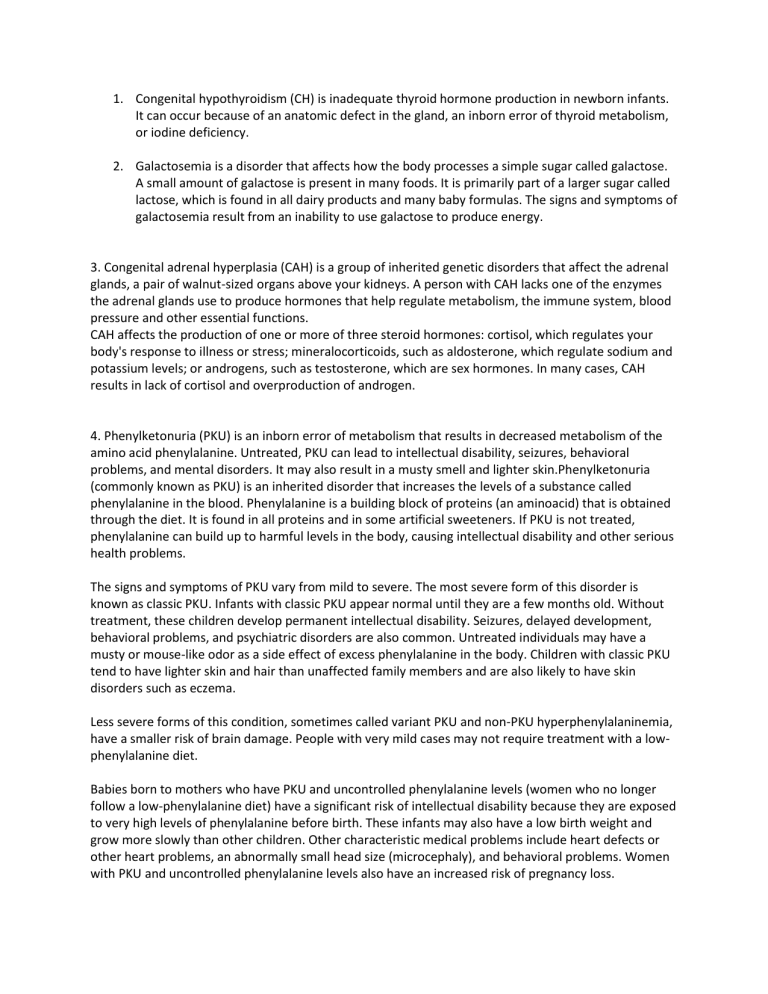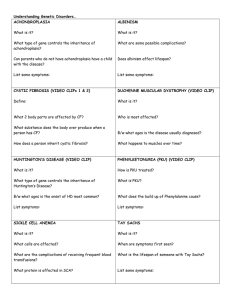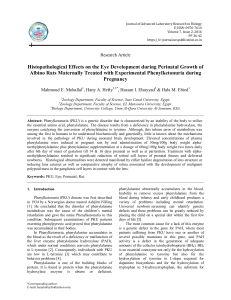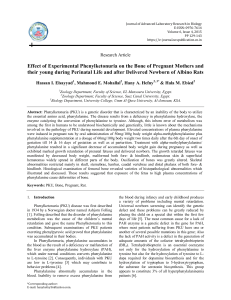
1. Congenital hypothyroidism (CH) is inadequate thyroid hormone production in newborn infants. It can occur because of an anatomic defect in the gland, an inborn error of thyroid metabolism, or iodine deficiency. 2. Galactosemia is a disorder that affects how the body processes a simple sugar called galactose. A small amount of galactose is present in many foods. It is primarily part of a larger sugar called lactose, which is found in all dairy products and many baby formulas. The signs and symptoms of galactosemia result from an inability to use galactose to produce energy. 3. Congenital adrenal hyperplasia (CAH) is a group of inherited genetic disorders that affect the adrenal glands, a pair of walnut-sized organs above your kidneys. A person with CAH lacks one of the enzymes the adrenal glands use to produce hormones that help regulate metabolism, the immune system, blood pressure and other essential functions. CAH affects the production of one or more of three steroid hormones: cortisol, which regulates your body's response to illness or stress; mineralocorticoids, such as aldosterone, which regulate sodium and potassium levels; or androgens, such as testosterone, which are sex hormones. In many cases, CAH results in lack of cortisol and overproduction of androgen. 4. Phenylketonuria (PKU) is an inborn error of metabolism that results in decreased metabolism of the amino acid phenylalanine. Untreated, PKU can lead to intellectual disability, seizures, behavioral problems, and mental disorders. It may also result in a musty smell and lighter skin.Phenylketonuria (commonly known as PKU) is an inherited disorder that increases the levels of a substance called phenylalanine in the blood. Phenylalanine is a building block of proteins (an aminoacid) that is obtained through the diet. It is found in all proteins and in some artificial sweeteners. If PKU is not treated, phenylalanine can build up to harmful levels in the body, causing intellectual disability and other serious health problems. The signs and symptoms of PKU vary from mild to severe. The most severe form of this disorder is known as classic PKU. Infants with classic PKU appear normal until they are a few months old. Without treatment, these children develop permanent intellectual disability. Seizures, delayed development, behavioral problems, and psychiatric disorders are also common. Untreated individuals may have a musty or mouse-like odor as a side effect of excess phenylalanine in the body. Children with classic PKU tend to have lighter skin and hair than unaffected family members and are also likely to have skin disorders such as eczema. Less severe forms of this condition, sometimes called variant PKU and non-PKU hyperphenylalaninemia, have a smaller risk of brain damage. People with very mild cases may not require treatment with a lowphenylalanine diet. Babies born to mothers who have PKU and uncontrolled phenylalanine levels (women who no longer follow a low-phenylalanine diet) have a significant risk of intellectual disability because they are exposed to very high levels of phenylalanine before birth. These infants may also have a low birth weight and grow more slowly than other children. Other characteristic medical problems include heart defects or other heart problems, an abnormally small head size (microcephaly), and behavioral problems. Women with PKU and uncontrolled phenylalanine levels also have an increased risk of pregnancy loss. 5. G6PD deficiency is a genetic abnormality that results in an inadequate amount of glucose-6phosphate dehydrogenase (G6PD) in the blood. This is a very important enzyme (or protein) that regulates various biochemical reactions in the body. G6PD is also responsible for keeping red blood cells healthy so they can function properly and live a normal life span. Without enough of it, red blood cells break down prematurely. This early destruction of red blood cells is known as hemolysis, and it can eventually lead to hemolytic anemia. How’s G6PD deficiency treated? Treatment for G6PD deficiency consists of removing the trigger that is causing symptoms. If the condition was triggered by an infection, then the underlying infection is treated accordingly. Any current medications that may be destroying red blood cells are also discontinued. In these cases, most people can recover from an episode on their own. Once G6PD deficiency has progressed to hemolytic anemia, however, more aggressive treatment may be required. This sometimes includes oxygen therapy and a blood transfusion to replenish oxygen and red blood cell levels. You will need to stay in the hospital while receiving these treatments, as close monitoring of severe hemolytic anemia is critical for ensuring a full recovery without complications.








